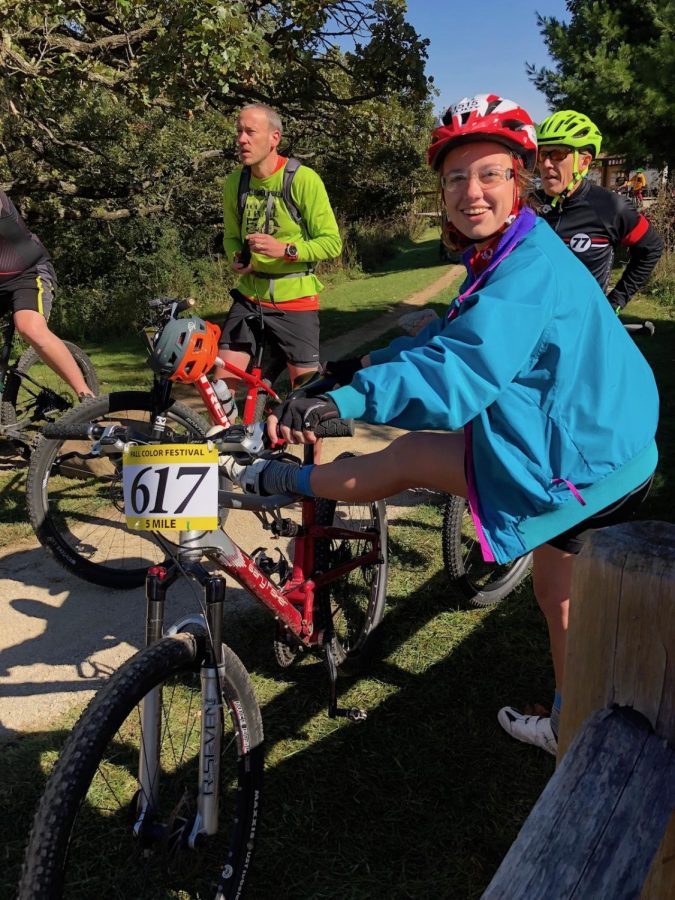Winning isn’t everything
A weekend mountain bike ride raises an ethical dilemma
Photo by Audrey Neupert
Clara Neupert stretches her hamstrings on her bike before the start of her race. Though the Fall Color Festival was in Southern Wisconsin, the Eau Claire area is home to several mountain bike trails. Mountain bikes can be rented through the Environmental Adventure Center on campus.
I participated in a small mountain bike race named the Fall Color Festival last Saturday. The venue was a beautiful forest preserve with trails that weave between pine trees. The race directors always set up tents with T-shirts, free coffee and a bonfire. The atmosphere is unmatched by any other race I’ve completed.
The morning was a little different from years past: It presented an ethical dilemma. The race’s story is one I want to tell, so I’m taking a break from my regular Vigor in the Valley chit-chats to share it.
During the race’s staging, I buckled my helmet and stretched my hamstrings. I wasn’t nervous at all — even though I didn’t really know the course. The race was five miles long and would take about a half hour to finish — a joyride, really.
As I stretched my legs, I remembered the last time I’d been at the Fall Color Festival, about five years ago. I’d won the same race I was about to start. Winning is a rarity for me. It’s something I don’t usually shoot for, but Saturday I challenged myself to win again.
Finally, the race official yelled into his handheld megaphone to start the race. As I rode off into the trees, I wove in and out of swerving riders.
Fueled by adrenaline and elation, I zipped around hairpin turns and jumbled over rocks. I actually didn’t crash, and I wheeled across the finish line with a smile on my face.
The other finishers in the chute beside me were all men, which meant I must have won the women’s race. I was proud of myself because the month of training I’d endured beforehand had given great results.
I walked over to my fanbase (my parents) still panting with a sweaty grin pasted on my face. But they immediately burst my bubble. They said I hadn’t been the first woman to cross the finish line.
Another woman had crossed the finish line several minutes before everyone else. My parents told me she was biking slowly and looking confused. The race officials shook their heads and seemed skeptical of her finish.
My parents pointed the woman out to me. I couldn’t remember her ever passing me during the race, but that didn’t mean she couldn’t have won. Though I was a little let down, I shrugged it off. Fair is fair, and I’d entered the race just to have fun.
Later, after several free bagels, I meandered over to the unofficial race results. They too confirmed I was the second female finisher. The woman who finished first walked up to the table, surrounded by her friends. When they saw her name at the top of the list, they started laughing. My parents and I overheard them say the first-place finisher said she had gotten lost during the race and cut the course short, causing her to finish before everyone else.
As we walked away from the table, my parents and I wondered if we should tell the race directors what we’d seen and heard. On one hand, the race was casual. Personally, I didn’t care about recognition if I knew I’d worked my hardest. If the first-place finisher wanted to collect a prize she might have not earned, that was up to her.
On the other hand, I thought about the situation from the eyes of the woman who finished in fourth place. If the first-place finisher was disqualified the fourth-place biker would be bumped up to third place, earning herself recognition and a beautiful wooden plaque. Additionally, the race officials would want the most correct results.
I tried to put myself in the place of the woman who’d gotten lost. It would be easy to get lost in the woods and embarrassing to admit it. If the chip timing system was so flawed, why not take advantage? My thoughts drifted back to the fourth-place finisher. No, I decided, I would not take the unearned first place. If I were in her place, I’d admit my mistake.
After discussion, we decided it wasn’t our place to try and correct the race results. Our proof wasn’t concrete, and our accusations would sound like an angry biker who wanted to fight for first place.
At root in this debate is the value one places in winning in earnest. Personally, I love to try my hardest. Winning doesn’t matter that much to me. Maybe this means I’m a product of my losing past. I’m used to coming in second, third or even last place. Does the loss of my competitive drive mean I’m not a true athlete?
I don’t think so. I define the word “athlete” as someone who moves their body or works their mind with the purpose of being healthy. My definition includes the winners and the losers and the people who just don’t care.
I think Dong Dong, a Chinese trampoline gymnast and Olympian, sums up my thinking best.
“No matter if you win or lose,” Dong said, “the most important thing in life is to enjoy what you have.”
Neupert can be reached at [email protected].

Neupert is a fourth-year journalism student at UW-Eau Claire. She is the executive producer of Engage Eau Claire on Blugold Radio Sunday. In her spare time, Neupert's working on becoming a crossword puzzle expert.

